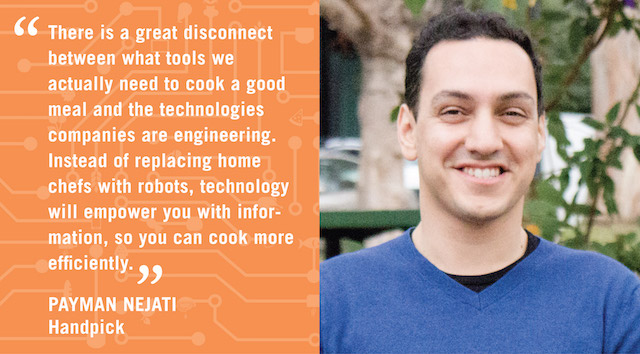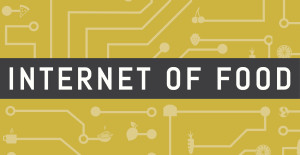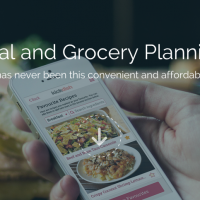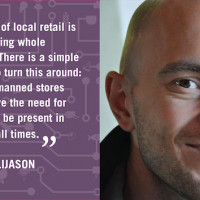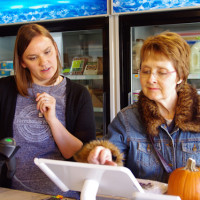Guest post by Payman Nejati, CEO of Handpick. The views expressed are are solely those of the author and do not reflect the views of Food+Tech Connect.
Drones and subscription box companies may be getting the headlines, but the future of grocery shopping will not be defined by technology or disruptors alone. Having spent fifteen years working with food manufacturers and grocery retailers, I believe the grocery retail industry needs to embrace the following ten innovations to address consumers’ evolving grocery shopping needs.
1. Find the right products for you

From price and convenience to dietary preferences, consumers have a lot to think about when they shop. In fact, a new report finds that 51 percent of consumers from across the country now factor health and wellness, safety, social impact, experience and transparency in their purchasing decisions. In the future, technology will make product labeling, merchandising and promotions intuitive and personalized to your preferences, so you won’t have to wander the aisles and struggle to find products that fit your dietary preferences.
2. Turn ingredients into food solutions

Instead of browsing recipe sites for inspiration and then going to your grocery store with a shopping list, your grocery store will show you everything you can make with the products they carry.
3. Shop smart

The way we shop for groceries today is inefficient and expensive. We buy more than we need and end up discarding a lot of our fresh food. In the future, your grocery store will bundle a set of ingredients that can be used across multiple meals, reducing food waste and your grocery bill.
4.Enjoy the experience

Dining at a restaurant is a pleasurable experience, but shopping for food at a grocery store can be a pain. Next generation grocery stores will become food hubs where you can buy a wide variety of ready-to-eat food you can enjoy on the spot and ready-to-cook food you can grab and take home.
5. Click less and get more

Online grocery stores are set up by aisle, category, product, brand and SKU, requiring too many clicks to add a single item to your cart. Intuitive e-commerce platforms will understand your tastebuds, account for what you have on hand, suggest what you could buy and show what you can make.
6. Set it and forget it

Don’t just rely on leftovers and care packages from mom. Your subscription snack box, meal kit, juicing plan and pantry essentials will arrive on a weekly basis.
7. Keep calm and carry on

No more struggling with grocery bags. Your order will be waiting for you at the store, placed in your trunk, included in your Uber ride, waiting at your doorstep or brought to you by a courier, a robot on wheels or a drone… all based on how fast you need it and how much you’ll be willing to pay.
8. Take over the kitchen

There is a great disconnect between what tools we actually need to cook a good meal and the technologies companies are engineering. Instead of replacing home chefs with robots, technology will empower you with information, so you can cook more efficiently.
9. Learn from food porn

Many of us share photos of what we eat on social media and drool over others photos. More than food porn, this rich data will help us track what we eat and, with the right tools, will help us establish healthier food habits.
10. End the waste

All of the food tech advancements mentioned above will not only bring us convenience and joy, they will also fundamentally reduce waste.
Internet of Food is an editorial series exploring how we might use technology, new business models and design to guarantee healthy, safe and sufficient food for everyone. Join the conversation between March 23 and April 29. Share your ideas in the comments, on Twitter using #internetoffood, Facebook, Instagram or LinkedIn, and follow the conversation by subscribing to our newsletter.
________________
 Payman Nejati is a serial food entrepreneur whose secret to market innovation lies in his cultural and business diversity. Born in Iran and raised between Belgium and the United States, Payman returned to San Francisco in 2013 to establish www.handpick.com after a decade spent in China in the food business.
Payman Nejati is a serial food entrepreneur whose secret to market innovation lies in his cultural and business diversity. Born in Iran and raised between Belgium and the United States, Payman returned to San Francisco in 2013 to establish www.handpick.com after a decade spent in China in the food business.
His first venture, which advised companies on how to communicate to the university market, was acquired by Omnicom, the world’s largest advertising holding group. He spent the next five years at Omnicom leading inter-agency integrations within four of the world’s leading ad agencies, DDB, TBWA, BBDO, and OMD. In 2009, he founded his second venture, developing hundreds of integrated marketing campaigns for 35 clients including Unilever, PepsiCo, Campbell’s, Nestle, Kraft Foods and The Coca-Cola Company. In 2013, he established Handpick as an innovative food tech platform that is solving the universal problem of food waste by providing recipe ideas with ingredients consumers have on hand.
Since then, Handpick has grown into a smart food data company with well over 1 billion social media food posts and 2 million recipes. It’s flagship product helps grocery retailers and e-commerce companies enter the meal kit market by leveraging existing SKUs and fulfillment channels, with the umbrella mission to reduce food and packaging waste.

